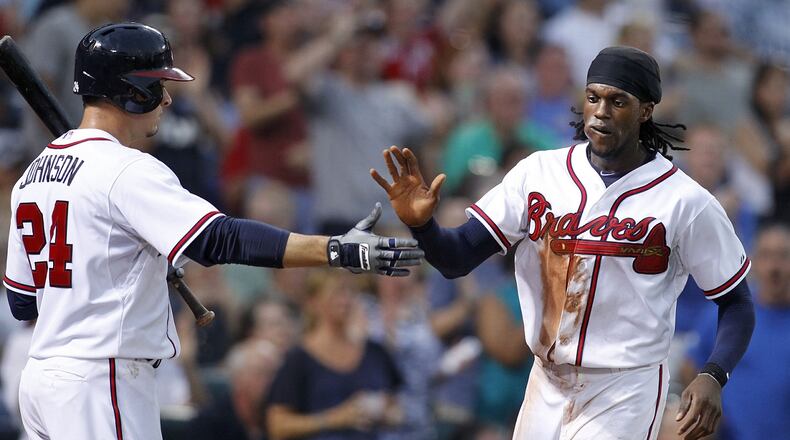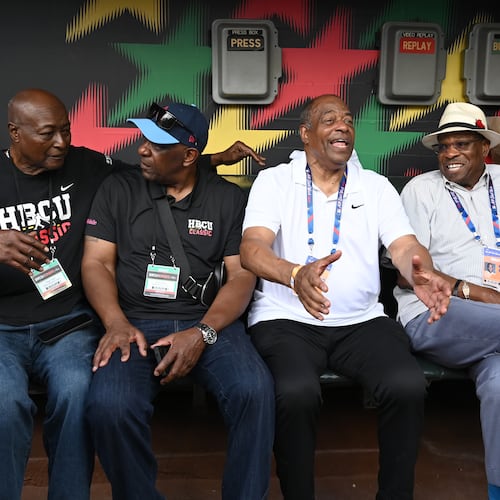The Braves aren’t approaching the trade deadline in everything-must-go mode, largely because most of what they have is young and cheap and just got here. Here’s manager Fredi Gonzalez on the team’s thinking: “John Hart (president of baseball operations) told me, ‘I like our team. We don’t have to do anything.’ ”
They probably will, though. The Braves arrived for work Monday afternoon seven games behind both the Nationals, who lead the National League East, and the Cubs, who hold the second wild-card spot. Baseball Prospectus rates the Braves’ playoff chances at 0.5 percent. There’s no longer a reason not to keep selling — when you’re rebuilding, you can never have too many prospects — but the measured corporate stance can best be described as, “Make us an offer.”
No, the Angels won’t dangle Mike Trout for Joey Terdoslavich, and Hart and John Coppolella fleeced the Padres enough over the offseason to make the twice-bitten A.J. Preller thrice shy. That in mind, here’s a semi-educated guess as what names might be discussed these next 10 days.
Jonny Gomes, outfielder: Off the field, he has done what the Braves wanted – help establish a work ethic. On the field, he has been the team's least valuable player (WAR value of minus-0.6.) It wouldn't take much to get him.
Chris Johnson, third baseman: The Braves would love to move him, but he's a bad player (minus-2.0 WAR the past two seasons) with a bad contract (owed $16.5 million over the next two years). Of all the deals lavished by former general manager Frank Wren, this always made the least sense. Even if the Braves could land a mid-level prospect for C. Johnson, they'd surely have to eat some of his salary.
Jim Johnson, closer: No contender will want J. Johnson to close – he's doing so here because Jason Grilli tore his Achilles – but he has value. Playoff teams can never have enough seventh-inning guys because in October they could be asked to work the sixth and even the fifth. And the Braves wouldn't mind seeing what Arodys Vizcaino can do with the ninth inning, which makes J. Johnson the closest thing to a lock to be dealt.
Kelly Johnson, outfielder/infielder: A playoff team needs an off-the-bench bat, and if the wielder of that bat can play multiple positions, so much the better. K. Johnson – who'll be a free agent come November – seems the second-most-likely Brave to go.
Cameron Maybin, center fielder: The most intriguing Brave and the definition of a sell-high guy. He's having a breakthrough season on a friendly contract. (He's under team control through 2017 for $17 million, total.) Given what they've seen, the Braves would be happy to keep him. Still, they have to wonder if what they're seeing is a raging blip. Should a blow-you-away offer arise, the Braves would listen – but it would take a passel of prospects for them to say yes.
A.J. Pierzynski, catcher: If a playoff hopeful wants to rent a 38-year-old backup catcher/pinch-hitter, the Braves might be inclined to let him leave – for two/three months. Pierzynski will be a free agent at season's end, and the team has warmed to him so much that it could bring him back next season on another short-term deal. As for the here and now: The demoted Christian Bethancourt will surely be recalled in September; why not summon him a month sooner and see if he has seen the light?
Julio Teheran, starting pitcher: Deadline sellers don't often part with 24-year-old starters who've been All-Stars; deadline sellers invariably thirst for young pitching. But Teheran has had a dud season (4.53 ERA) and has so flustered the Braves that Gonzalez pulled him Friday after 90 pitches with two out in the fifth inning of a tie game. The Braves haven't given up on one of the game's best young arms, but they might be willing to listen to offers. Such a trade would seem more suited to the winter than July, though.
Juan Uribe, infielder: He'd be a late-game piece for a playoff team. The Braves like him, but he's 36 and he'll be a free agent. He could be had for not a lot.
About the Author
Keep Reading
The Latest
Featured



